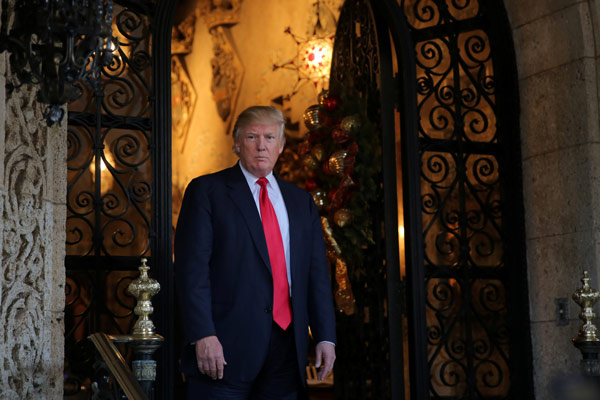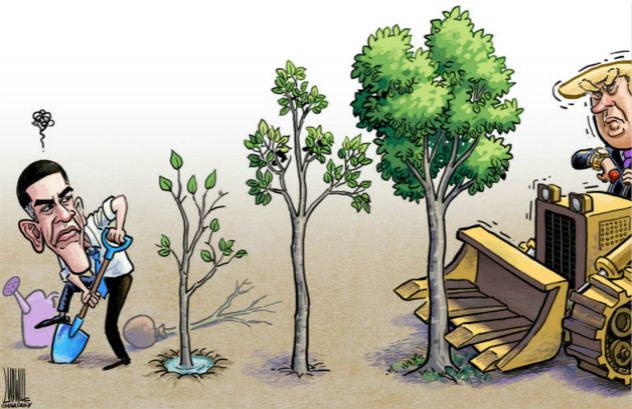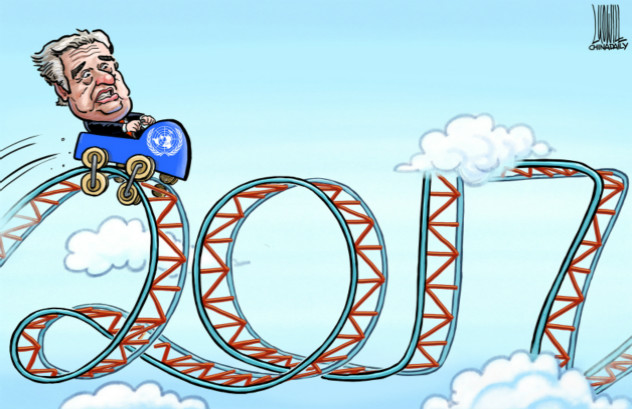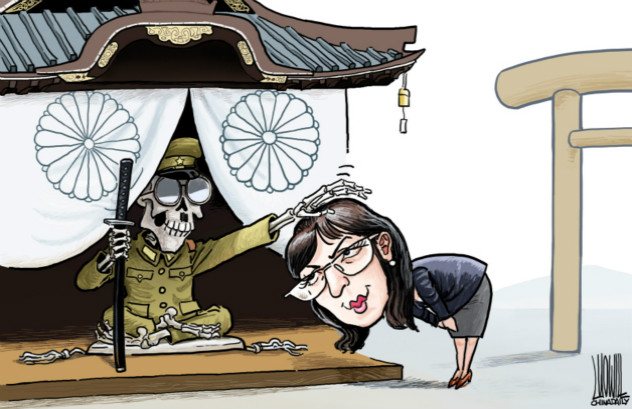Nuclear weapons race could weaken US security
 |
|
US President-elect Donald Trump pauses as he talks to members of the media at Mar-a-Lago estate in Palm Beach, Florida, US, December 21, 2016. [Photo/Agencies] |
US president-elect Donald Trump twittered in late December that the United States "must greatly strengthen and expand its nuclear capability until such time as the world comes to its senses regarding nukes". Later, he declared: "Let it be an arms race," and asserted that the US would win it. It seems he is committing a major mistake.
Like any other country, the US deserves its legitimate national security. The US first developed nuclear weapons through the Manhattan Project. And since the program was aimed at both keeping pace with the feared nuclear weapons development program of Nazi Germany and to counter imperialist Japan's aggression, it gained legitimacy.
But the US has often abused its nuclear policy. By flexing its nuclear muscles, the US pushed the Soviet Union to expedite its nuclear weapons program in the late 1940s. By threatening China with a nuclear attack during the Korean War (1950-53), it forced Beijing to launch its own nuclear weapons program in the mid-1950s. And by waging an unjustified war in Iraq, the US taught the Democratic People's Republic of Korea the importance of possessing nuclear weapons.
Despite the several rounds of nuclear disarmament, the US still deploys thousands of nuclear weapons and has more in its vaults. Russia has built a nuclear arsenal as powerful as the US', and China seems to have developed a cost-effective minimum deterrence to drive sense into potential rivals.
When Trump promised to strengthen the US' nuclear arsenal, in order to make other countries sensible, one wondered which countries Trump had in mind, and how much credit or damage his message would bring to the US and the world. Did he mean to have a nuclear arms race with Russia, especially because Moscow is the only other power to have an equally massive, if not bigger, nuclear arsenal than the US?
But US President Barack Obama realistically "reset" Washington's relations with Moscow in 2009 despite the Russia-Georgia conflict in 2008. And after Crimea's inclusion into Russia in 2014, president-elect Trump seems interested in again "resetting" relations with Russia. This contradicts Trump's own promise of "expanding nuclear weapons credibility", and could lead to another Georgia- or Ukraine-like crisis.
Or, does Trump have an eye on China? Over 60 years ago China decided, despite its poverty, to go nuclear given the US nuclear blackmail, and succeeded. Before China tested its nuclear weapons, the US made a dozen nuclear threats against China, but after Beijing detonated its first nuclear device in 1964, the US has not issued any open nuclear threats, vindicating the power of China's own nuclear deterrence.
China has maintained a practical nuclear strategy of minimum deterrence, which has both boosted China's national security and made it avoid an unnecessary nuclear arms race. At a time of resource scarcity, China's approach was certainly a smart one.
But times have changed. The World Bank has said that, in terms of purchasing power parity, China became the largest economy two years ago. As long as China doesn't perceive an increase in external threat, Beijing could live with its tradition. But if Trump forces other countries in a nuclear arms race, he could wake up to find that the US' relative nuclear credibility declining.
Rather than winning a nuclear weapons race, the US national security could weaken vis-a-vis even the DPRK. Before the DPRK conducted its first nuclear test, the US didn't face any physical nuclear threat from Pyongyang. Now, given its rising capability to build long-range ballistic and sea-launched ballistic missiles, even the DPRK could deter the US to certain extent, rather than merely the other way around. If Trump forces the DPRK into an arms race, the US could find itself facing more risks.
The US is already secure, and doesn't need to further expand its nuclear arsenal. Expanding the US nuclear arsenal could rather excite a nuclear race which America might not win. Therefore, the Trump administration should see the nuclear danger for what it is, and work with other countries for nuclear disarmament.
The author is a professor at, and associate dean of the Institute of International Studies, Fudan University.
- Trump calls for expanding US nuclear weapons
- China-US nuclear security center starts operation
- US nuclear weapons site to soon become tourist destination
- Li welcomes US nuclear teamwork
- Sino-US nuclear cooperation proposal lauded
- Kerry: Congress cannot modify Iran-US nuclear deal
- Joint Sino-US nuclear training center on track





















